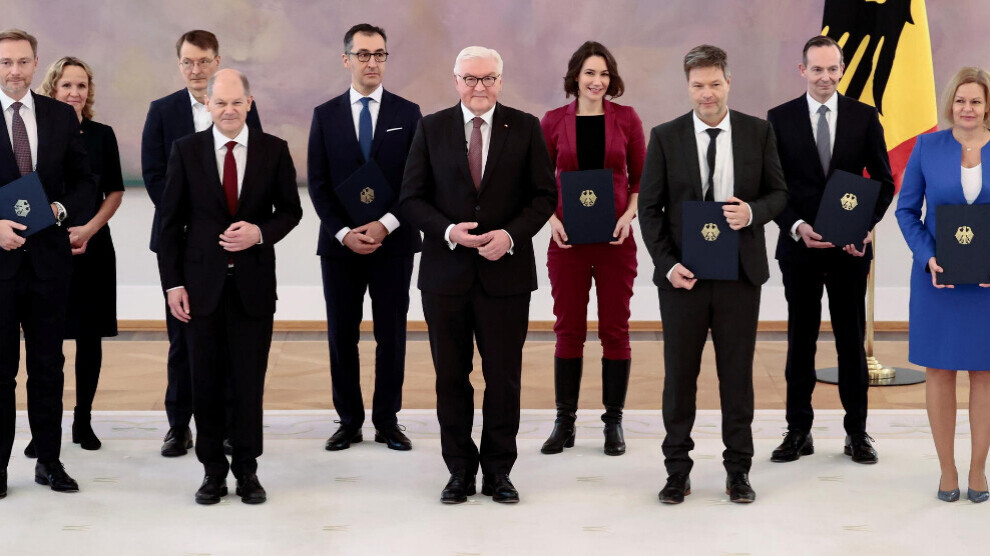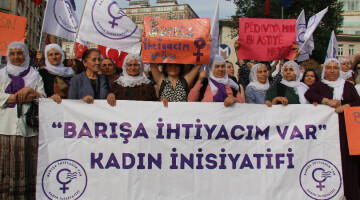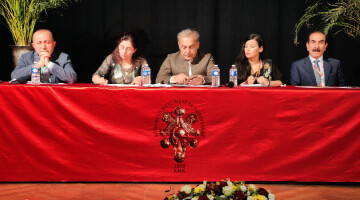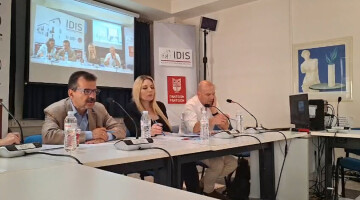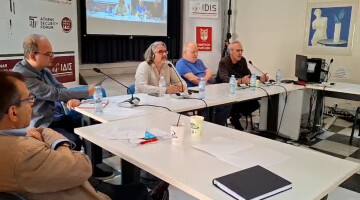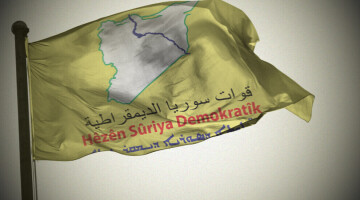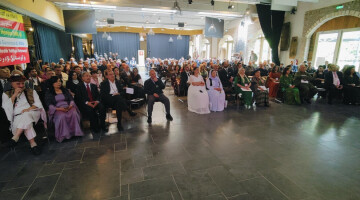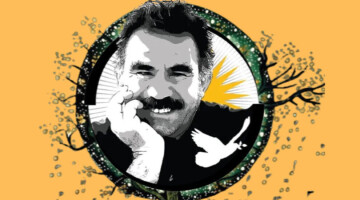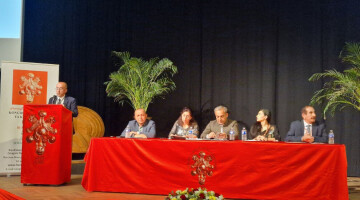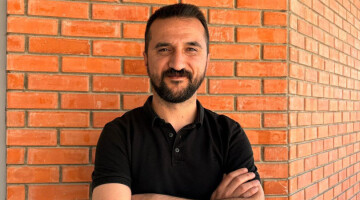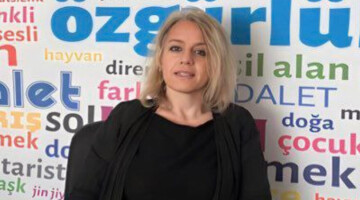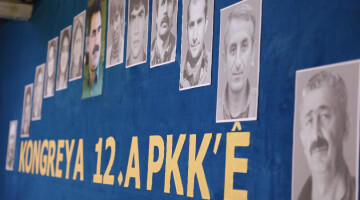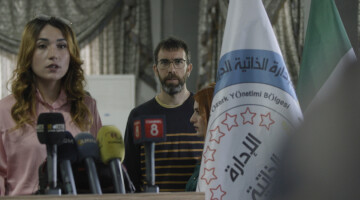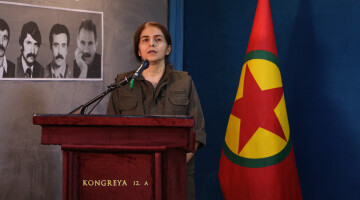The coalition government of three parties, the Social Democrats Party (SPD), the Green Party, and the Free Democrats Party (FDP), nicknamed the "Traffic Lamp" (Ampelkoalition) due to its yellow-red-green colours, officially began working on Wednesday with Olaf Scholz's swearing-in ceremony and appointment of ministers.
Willy Brandt succeeded Helmut Schmidt and Gerhard Schröder as Germany's fourth social democratic chancellor, and his SPD became a major partner in a federal administration for the first time since 2005. Similarly, the Green Party returned to the cabinet in 2005, and the FDP did so in 2013.
Scholz, 63, was Chancellor of the State of Hamburg from 2011 to 2018 and has been Deputy Chancellor and Finance Minister in Merkel's federal cabinet since 2018. Despite his proximity to the conservative/right-wing component of his party, Scholz attracts attention for his "inclusive" approach to all components of the SPD and his "balanced" policies.
“THE GOVERNMENT WILL BE PRAGMATIC”
Scholz, like his predecessor Merkel, supports a strong European Union and maintains contacts with global countries, particularly the United States. However, because his government is made up of three distinct parties, it is expected to "adopt a pragmatic and inclined approach" both at home and internationally.
So, with the new administration, what changes can be expected in Germany's Kurdish policy? Without a doubt, the answer to this question depends on the connection it would build with the AKP-MHP administration, which practices genocide/occupation in three parts of Kurdistan.
There are significant elements of the SPD and Green Party bases, particularly in the youth wings of these parties, who want the Kurdish people to live freely and equitably, and who believe that the opposition to the Erdogan dictatorship should be firmer. It is unclear how influential these parts will be in the Scholz administration's actions.
Based on Scholz's statement/assessment prior to becoming Prime Minister, the election programs of the SPD, Greens, and FDP that formed the government, and the profiles of the ministers involved in the issue, it is possible to summarize what the new government might change in the German state's policy towards the Kurdish people under three headings:
1-Cooperation with the Erdogan regime: Judging from Scholz's statements so far, there is a possibility that he will continue on the line marked by Angela Merkel, whom the world media describes as "Erdogan's best friend in the West". In fact, his party SPD, in the election program, had only said "we are worried" about the increasing human rights violations, anti-democratic practices and the end of the rule of law in Turkey.
It is vital to note that Scholz is not a member of the team of Frank-Walter Steinmeier, Gerhard Schröder, and Sigmar Gabriel, who is known as SPD Turkey supporters and held major positions such as the prime minister, foreign minister, and president during Erdogan's 20-year rule.
However, the "Turkish policy" developed with the AKP-MHP administration through the refugee deal, military-economic cooperation, and NATO membership, which did not enrage the "sick man of the Bosphorus" Erdogan and has now become Germany's state policy, appears to continue after Merkel. In short, it is suggested that the new prime minister, like his predecessor, will behave in a considerably subtle way, rather than openly criticize the Erdogan dictatorship. This will undoubtedly imply support for the AKP-MHP fascist bloc's destruction/occupation program towards the Kurdish people, as well as condoning pressure on the opposition.
So, will the Green Party's Annalena Baerbock's appointment to the Foreign Ministry result in a shift in Berlin's relations with Ankara?
Prior to the election, practically all Green Party politicians were fiercely critical of Erdogan's rule. In fact, while Baerbock stated that "Turkey should not receive financial aid until it returns to democracy and the rule of law," his party included in its electoral platform the suspension of collaborative military projects with Turkey, such as submarines.
According to some commentators, Baerbock will pursue a pragmatic approach similar to that of his party colleague Joschka Fischer, who served as foreign minister from 1998 to 2005. The Council of Europe's position on the Kavala and Demirtaş cases, as well as choices on the situation of Kurdish People's Leader Abdullah Öcalan, will be Baerbock's most crucial test in the near term.
2-Prohibition and criminalization: Another critical issue for the Kurdish people in Germany is the country's prohibition and criminalization policies toward the Kurdish freedom struggle.
Nancy Faeser, a social democrat for the first time in 16 years and a woman for the first time in the country's history, was appointed Home Secretary when the new administration won office. It is unclear to what extent Faeser, who is from the SPD's right-wing, will follow in the footsteps of previous minister Horst Seehofer, who extended the ban on Kurdish symbols and flags and had the doors of Mir Music and Mesopotamia Publications sealed. Faeser's SPD, on the other hand, has yet to give the Kurds a positive thumbs up.
The criminalisation of Kurdish people, which became a state policy in connection with the PKK ban imposed by the Kohl government in 1993; was further entrenched during the Social Democrat-Green coalition led by Schroeder, which ruled the country from 1998 to 2005. Otto Schily's involvement as SPD Minister of Interior in the late 1990s and early 2000s was pivotal in adopting a tough stance towards Kurds. Schily had pushed for German Red Army (RAF) militants in the early 1970s, in addition to his social democrat identification.
3- Rojava and Bashur politics: One of the most intriguing issues is the Scholz government's stance on Bashur (South) and Rojava Kurdistan.
The Merkel government was not content to remain silent about the Turkish state's invasion attacks on other parts of Kurdistan; it took on the task of modernizing German-made Leopard tanks in the hands of the Turkish army prior to the invasion of Afrin, supported the building of SIHAs that murdered civilians and elected politicians in the Autonomous Administration of Northern and Eastern Syria and Shengal.
Despite her occasional criticism of the Turkish state's expansionist policy and desire to "strengthen the Kurdish structures in Syria and Iraq," particularly in the fight against ISIS, the Merkel government's Defense Minister Annegret Kramp-Karrenbauer hosted the Turkish state‘s Minister of Defense Akar a few days before the Garê attack in February 2021.
Christine Lambrecht, who was Minister of Justice in Merkel's ministry and harshly condemned Turkey on human rights and democracy issues, will serve as Defense Minister in Scholz's cabinet. As a result, one wonders how Lambrecht will deal with Turkey's occupation strategy, the Autonomous Government of Northern and Eastern Syria, and the administration of Southern Kurdistan.

